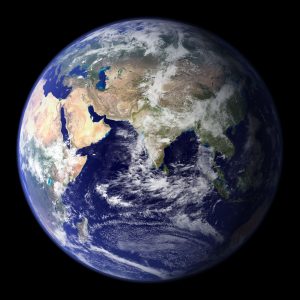By Missy Smith
“MOM!!!” my three year old daughter stated in a reprimanding voice, “You CANNOT throw that paper in the trash!!!”
I took a deep breath, as I turned around trying to decide just how I wanted to respond to the attitude that my three year old daughter exhibited all of a sudden.
“Bella,” I said, “I can throw whatever I want into the trash! This is my house and my trashcan. When you grow up you can tell me what not to do at your house but for now I make the rules.”
I thought to myself, “Ha! That will get her…..my little sassy three year old won’t tell me what to do again.”
Then she looked at me straight in the eyes, as I could see the anger and hurt rising up in hers as she said, “Fine, but that is just one more thing you will send to the landfill to ruin God’s earth! Reduce, Reuse, Recycle- MOM!”
She got me there and from that time forward our family started to recycle.
After more conversation with my daughter we learned that she had been learning at her preschool about Earth Day and how we must be responsible to take care of God’s creation. I had never really thought about recycling until then or the environment until then. Once we started to listen to our child and did some research of our own, my husband and I were amazed at the state of creation.
Here are some of the interesting things we have learned:
- More than 100 billion pieces of junk mail are delivered in the United States each year.
- The U.S. buried or burned more than 166 million tons of resources – paper, plastic, metals, glass and organic materials – in landfills and incinerators last year.
- It only takes about 6 weeks total to manufacture, fill, sell, recycle, and then remanufacture an aluminum beverage can.
- Half the world’s tropical and temperate forests are now gone. (These are the forests God created)
- More than 2 million people globally die prematurely every year due to outdoor and indoor air pollution.
- Every year in the U.S. nearly 200 billion beverage containers are sold, two-thirds of which are landfilled, incinerated or littered.
- Recycling, reuse and remanufacturing account for 3.1 million jobs in the U.S.
- Recycling saves 3 to 5 times the energy that waste incinerator power plants generate.
- From 1970-2010 biodiversity has decreased by 52%. (This means that we have lost 52% of God’s creation in the past 40 years)
- There are water shortages all over the world. (Cape Town South America is expecting to be without water within 3 months) (www.earthday.org or www.ecocycle.org)

The facts are the facts, and the truth is that we no longer have to sit back and wait for a problem to happen with our environment —problems are already here. Environmental tragedies are happening now, we just simply need to decide to do something in response.
So what does the Bible tell us? “O Lord, how manifold are your works! In wisdom you have made them all; the earth is full of your creatures. Yonder is the sea, great and wide, creeping things innumerable are there, living things both small and great.” Psalm 104:24-25. God created the earth and all its creatures and we are his unique creation that he has commissioned to care for it. As we care for his creation he provides us with opportunities to share with those that are lost how HE cares for them. So today I challenge you, and me, with this question: How can you care for our planet earth? How can we be good stewards that honor God as we care for his creation?
Here are some ways to serve the Lord by caring for his creation:
- Take part in FBC Shelby’s Community Garden.
- Recycle at home and at church.
- Participate in litter pick-ups around our community.
- Support agencies that provide clean water to those who need it.
- Reduce waste.
- Educate yourself on environmental issues.
- Find creative ways to reuse items.
- Take part in city recycling programs.
- Conserve water use.
- Save power by closing doors and turning off lights.
We need to engage our world to better care for planet earth for God has entrusted us to do. I think that if we do we will see lives changed for HIS glory. So I leave you with this thought and challenge, “We care for the earth and responsibly use its abundant resources, not according to the rationale of the secular world, but for the Lord’s sake. If Jesus is Lord of all the earth, we cannot separate our relationship to Christ from how we act in relation to the earth. For to proclaim the gospel that says, ‘Jesus is Lord’ is to proclaim the gospel that includes the earth, since Christ’s Lordship is over all creation. Creation is thus a gospel issue within the Lordship of Christ.” (Taken from – Cape Town Covenant, 2011, Lausanne Movement.)
[Earth Day is Sunday, April 22]
